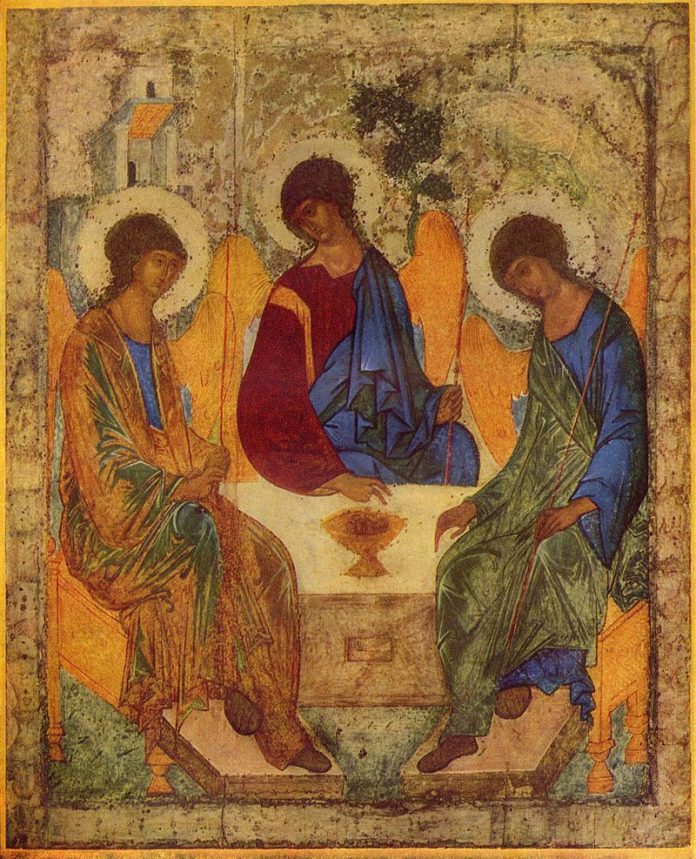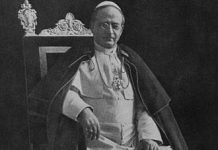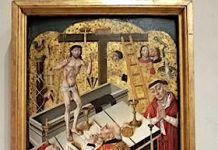For you did not receive a spirit of slavery to fall back into fear, but you have received a spirit of adoption to sonship. (Rom. 8:15). ⧾
The Sunday following the Solemnity of Pentecost celebrates the Mystery of the Most Holy Trinity, the central mystery of Christian faith and life. It is the Mystery of God Himself (The Catechism of the Catholic Church, #234). The Mystery of the Most Holy Trinity is an absolute mystery. It is a mystery of faith in the strict sense, one of the mysteries that are hidden in God, which can never be known unless they are revealed by God (The Catechism of the Catholic Church, #237). As the central Mystery of the Christian faith, this mystery reveals that the God whom we worship is neither absent from His people nor fully identifiable with them. The life of Our Lord on earth is a gradual revelation of this Mystery, culminating with the revelation of the Holy Spirit as a Divine Person on Pentecost. The logic of the sacred liturgy rightly places today’s Feast on the Sunday after Pentecost.
This Mystery that God has revealed to us is more than a dogmatic, religious truth. The Mystery of the Most Blessed Trinity is the central mystery of Christian faith and life. As such, by contemplating this Mystery we receive and learn a way of life. In the words of an antiphon from the Liturgy of the Hours, more precious than gold or silver, Lord, is the way of life you teach us (Antiphon, Daytime Prayer, Thursday, Week II). We do not worship an abstract thought or theory, a force or ‘Supreme Being’, but a Trinity of Persons who dwells in us through grace. The complexity of this Mystery, at face value, speaks to its truth. St. Thomas Aquinas observed that the truth of the Christian faith exceeds not only human minds but also those of angels; we believe in them only because they are revealed by God (De Rationibus Fidei).
The indwelling of God in the soul through grace is our participation in the life of the Trinity, our sharing in the divine nature. To live our lives in a manner befitting our dignity as children of God, we need to keep this truth always in the forefront of our minds. On this Trinity Sunday we ought to ask God to grant us a profound spirit of adoration for the Triune God, of imitation of such profound love and of reparation for the sins of both commission and omission in a world where so much has been done and continues to be done to deny this truth; and where as a result, iniquity has abounded and the charity of many has grown cold (Cf. Mt. 24:12). Very cold. We have experienced and continue to experience the effects of the absence of the Christian spirit in society; and cruelty abounds, especially towards the weak and helpless.
Christianity, our faith, the true faith revealed by God with its essential belief in the divinity of Jesus Christ, true God and true man, is not easy to understand for it is mysterious. It is not carnal; that is, it does not promise heavenly rewards that satisfy our physical senses. Our Lord counseled chastity, modesty and temperance for both men and women. Nor is Christianity harsh, for Our Lord offers forgiveness and redemption and He enjoins us to become gentle and humble of heart. How foolish and wrong it is to assert that all religions are equal. This is the error of our times; the consequence of relativism. There is no discussion here of a mysterious truth like the Trinity; the tremendous and fascinating Mystery that we adore in humble and joyful submission.
Adoration (i.e. profound love) is a free and loving submission of our whole being to God; to Divinity that is infinitely superior to all nature. Before the Mystery we cry out: Holy, Holy, Holy; Sanctus, Sanctus, Sanctus: doing so with great thanksgiving for we are created in the image and likeness of this God; and through grace share His very life, striving to become as He is –holy, godly. This Trinitarian Mystery reveals to us the inner life of God; that God is personal and relational; we too are personal and relational beings. In contemplating the Trinity we come to know who we are and what we are called to be and we come to an ever deeper understanding of our ultimate destiny in God. This Mystery provides us with a proper and true understanding of the human person that fosters human life and all human achievements as a praise of God’s glory (laus gloriae) (Cf. Eph. 1:12).
If we live in the light of this truth our lives are literally transformed and through us, the world around us will also be transformed. This Mystery is not an abstraction but the source and destiny of all that is. Again, St Paul teaches us: For you did not receive a spirit of slavery to fall back into fear but you have received a spirit of adoption to sonship. When we cry, ‘Abba! Father!’ it is that very Spirit bearing witness with our spirit that we are children of God (Rom. 8: 15). As believers and disciples, our task is to make this truth known. Ultimately, it is the very life of man, man himself living righteously, that is the true worship of God, but life only becomes real life when it receives its form from looking toward God (Joseph Cardinal Ratzinger, The Spirit of the Liturgy).
Looking toward God in holy worship, in adoration, is the transformative experience of the sacred liturgy. In the beauty of holiness and the holiness of beauty, we learn to perceive both in ourselves and in the world around us something of the wonder of the Mystery of the Triune God; and beholding the glory of the Lord, we are transformed into His likeness from one degree of glory to another by the Lord who is the Spirit (2 Cor. 3:18). This is how our lives become a praise of God’s glory (laus gloriae); and how we become the very aroma of Christ to God (2 Cor. 2:15); a sign of hope in a harsh and cruel world. By extension in the daily rhythm of our life, in the intimacy of our family life and in the bonds of unity and charity that bind us together in our community of faith, our worship continues when through love we endeavour to be servants of one another (Cf. Gal. 5:13). ⧾












